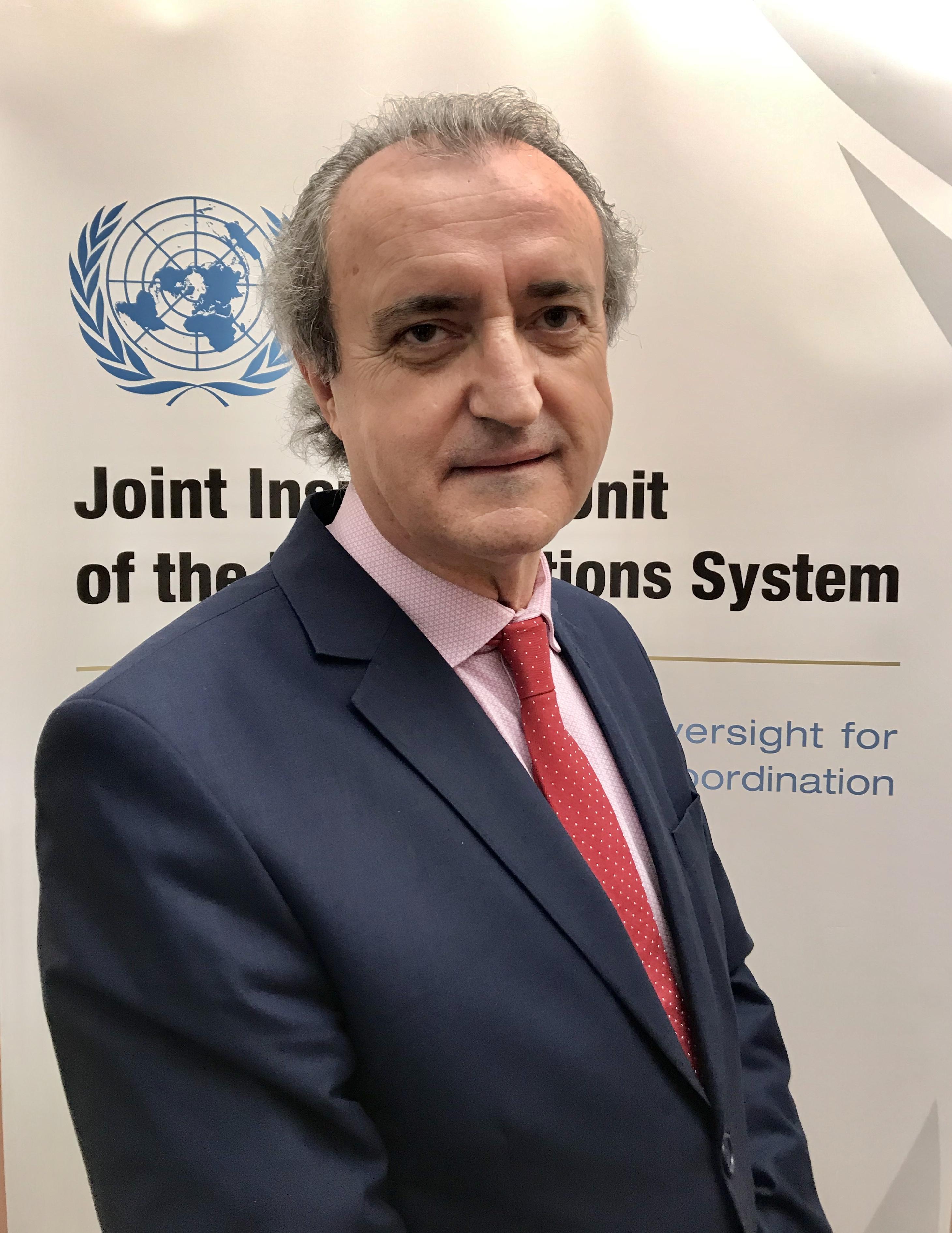- عربي
- 中文
- English
- Français
- Русский
- Español
Interview of Inspector Jesús Miranda-Hita
Date: 9 March 2021
Please say a few words about "who you were" in your professional life before joining the JIU?
I worked for 38 years in the Spanish Administration, in a wide variety of roles, including executive, political and, during the last nine years, control and supervisory functions, as an Inspector of Services of Economy and Finance. To put it briefly, I can say that I am very used to studying and transforming organizations, leading people, designing and drafting policies, budgets and regulations and rules, and measuring results.
In terms of my qualifications, I am an economist and a member of the Body of Inspectors of Taxes and Customs, the Body of Auditors of the State, and the Body of Inspectors of Services, a function very closely related to that of an Inspector of the JIU.
What about the JIU do you find most attractive in terms of its role in the UN system and the value it can add?
The main strength of the JIU is its status as it stands as the only external oversight body with a mandate on the overall United Nations system. This is an uncommon institutional arrangement, at least in the national administrations I am familiar with, where there is usually a Court of Auditors with institutional competence of universal scope but mostly focused on budgetary or financial aspects.
The JIU can and should review financial aspects, of course. Still, its horizon is much broader since our objective is to help improve the performance of organizations in the broadest sense of the term. And it is this unique capacity, namely to be able to analyze, assess everything of interest that constitutes, in my view, the main value the JIU can add to the work of the United Nations.
The advantages that stem from JIU unique position are essentially twofold: on the one hand, the JIU enjoys reinforced functional independence, as a result of its status as a subsidiary organ of the General Assembly and the legislative bodies of the participating organizations. Secondly, it provides a bird's eye view of policies, regulations, organizations, procedures, and results, enabling us to propose more efficient and effective changes, based not only on the principles of complying with the rules, sound regulation and good management, but also on the best practices that can be found by examining such a vast and complex conglomerate as the United Nations is.
And all of this with a view to a single purpose: to help the participating organizations we serve to better fulfill their mandates to deliver their mission in the most efficient, effective and productive way, with full observance and respect of the rules of the game and the principles of the Charter of the United Nations. All this makes the JIU a very unique organization.
When the opportunity arises, what subjects would you like to work on during your tenure at JIU?
As a professional auditor, I have to confess that I like almost every subject.
Basically, the process is always the same: find out the relevant facts, analyze them, draw meaninful conclusions and, if needed, suggest changes to improve what is being done well or correct what is being done poorly. And this applies to every project, it doesn’t depend on the subject matter, that is only the background, the methodology remains the same. It is as simple, and as complex, as that.
If you ask me specifically about any subject of my preference, I could mention budgeting, recruitment, procurement, objective and strategic planning, performance measurement, internal control and quality assessments. Anything that can be measured and that is not subject to subjective preferences but to general rules, principles and standards.
That is tantamount to say anything that leads to relevant conclusions and important changes. I don't like to waste time looking at meaningless matters and describing what the client already knows without adding any value. I do not have a name to define this disease, but it is an occupational disease that attacks from time to time people performing control or audit functions, who sometimes show a tendency, or a temptation, to get too descriptive and not sufficiently analytical. For better or worse, I do not belong to this category, nor do I suffer from this disease, I think.
What are you looking forward to in your first JIU report?
Obviously, the first thing I am interested in is to understand the working methods of an organization that deals simultaneously with 28 customers. This complexity of managing so much information related to 28 different entities to reach clear conclusions, that is the magic of the JIU and I am looking forward to understanding the working procedures of the organization in practice. This is truly new to me, and certainly the most attractive and complex aspect of my new role compared to my previous national internal auditor position.
How have you settled into the JIU and Geneva, so far – especially considering the extraordinary circumstance due to COVID?
These are difficult, strange times in which behaviors that were once frowned upon have now become convenient and even mandatory, like avoiding others' proximity.
Even though we are getting used to it, this is not what we, as human beings, want and need. Besides, I didn't even have a chance to meet all the staff, which I would have loved to do from day one. The pandemic covers and alters everything.
Fortunately, we are already beginning to see some light on the horizon, and with the vaccine, we will be able to normalize our lives, in which social interaction is paramount. And of course, I plan to take 110% advantage of the social and cultural life of this beautiful city as much as the geography and landscapes of this magnificent country. Not a bad program for the post-pandemic era, right?


